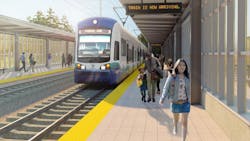Sound Transit’s Federal Way Link Extension design-build contract now more than 25 percent complete
Sound Transit has announced its design-build contract for the Federal Way Link Extension project is more than 25 percent complete, with final design scheduled to be completed by mid-2021.
This demonstrates significant progress of the project following the launch of heavy construction in July 2020.
"Community members across the region can watch the rapid construction progress that is now underway and look forward to 2024, when they can ride a light rail network that we’re on track to nearly triple, from 22 to 62 miles. Seven out of eight of our major projects under construction are on or below budget and on or ahead of schedule," said Sound Transit CEO Peter Rogoff. "These projects and the voter-approved projects that will follow will be critical both for our mobility and for creating thousands of jobs to help us rebound from the pandemic recession."
Sound Transit broke ground with heavy construction for the Federal Way Link Extension last July following utility and site preparation work that got underway in 2019. Progress to date includes completing 30 of 121 drilled shafts for constructing elevated guideway and station facilities. Last month, crews also achieved a major milestone with the completion of a bypass route on State Route 99 in SeaTac. The bypass will enable a partnership with the Washington State Department of Transportation to build a bridge over the roadway during 2021 and 2022.
Work is underway on three new light-rail stations and will begin on three new garages, which will add 2,000 new parking spaces for riders in Des Moines, Kent and Federal Way.
Kiewit Infrastructure West Company is the design-build contractor for the $3.1-billion project. It is funded in part by a $790-million grant from the Federal Transit Administration and a $629.5 million Transportation Infrastructure Finance and Innovation Act (TIFIA) loan from the U.S. Department of Transportation.
While projects currently in construction continue to move forward on schedule, further voter-approved expansions face an unprecedented and extremely challenging financial environment, says Sound Transit. A pandemic-driven recession that has severely reduced consumer spending and tax revenues has converged with increased cost estimates driven by real estate and construction market pressures.
The Sound Transit Board has begun a realignment process that is moving forward under a two-pronged approach. The first prong prioritizes aggressively seeking new federal and state funding to help bridge an $11.5-billion affordability gap for completing projects on their original schedules. To the extent that sufficient new resources are not secured, the board’s second prong, as required by the ST3 Plan, will utilize the plan’s identified tools to ensure affordability under updated projections for current revenue sources.
